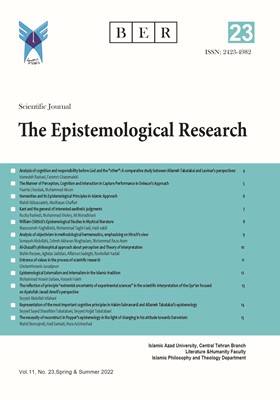Kant and the general of interested- aesthetic judgments
Subject Areas : Epistemological researchesًRozita Rashedi 1 , Mohammad Shokry 2 * , Ali Moradkhani 3
1 - Islamic Azad University, North Tehran Branch, Tehran, Iran
2 - Assistant professor at Department Of philosophy,Tehran North Branch, Islamic Azad University ,Tehran, Iran
3 - Associate Professor at Department Of philosophy,Tehran North Branch, Islamic Azad University ,Tehran, Iran
Keywords: taste, Kant, subjectivity, Intersubjectivity, Kant's Theory of interest,
Abstract :
Kant considers the nature of rules of the taste to be interested, but at the same time believes that an objective basis can be found for the totality of these rulings in the power of judgment. First, given the coexistence of subjective and intersubjective elements in Kant's theory of interest, what relation does he establish between the subjective and the intersubjective judgments of taste? To answer this question, in the first part, while examining the logical features of the aesthetical sentence, we show that this sentence, in his view, is an aesthetic sentence that is issued in complete freedom and autonomy of the subject and by the other has a certain kind of general validity in its content. This kind of general validity, since it is purely based on transcendental structures which are common among all judgmental subjects, also has an intersubjective aspect, which Kant calls the names of subjective generality, aesthetic generality, and universal validity. Second, how does Kant strike a relation between the subjective and the intersubjective? To answer this question, in the second part, we argue that Kant, although he believes in the subjectivity of the judgment of taste, considers this subjectivity to be of a special kind, which is the other aspect of intersubjectivity. For this purpose, we first try to explain the meaning of the subjectivity of the judgment of interest, and then to clarify the intersubjective aspect of this meaning. Finally, we show that Kant, based on the intersubjective validity he finds in the judgment of interest, considers the faculty of interest as a capacity for empathy between subjects and to bring them out of isolation.
کانت، ایمانوئل 1386، نقد قوۀ حکم، ترجمۀ عبدالکریم رشیدیان، تهران: نشر نی.
هیوم، دیوید 1385، در باب معیار ذوق، ترجمۀ علی سلمانی، تهران: فرهنگستان هنر.
Ginsborg, Hannah (1990) The Role of Taste in Kant’s Theory of Cognition
(New York: Garland Publishing).
Kant, Immanuel (1987) Critique of Judgment, tr. Werner S. Pluhar (Indianapolis: Hackett Publishing).
Hume, David, (1385) at the taste criteria, Tehran: The Academy of Arts.
Allison, E. Henry (2001) Kant’s Theory of Taste: A Reading of the Critique of Aesthetic Judgment (Cambridge and New York: CambridgeUniversity Press)
Atalay, mehmet (2007) “Kant’s Aesthetic Theory: Subjectivity vs. Universal Validity”, in Percipi, Vol. 1, 2007, pp. 44 − 52.
Bowie, Andrew (2003) Aesthetic and Subjectivity from Kant to Nietzsche (Manchester and NewYork: Manchester University Press).
Cassirer, H. W. (1938) A Commentary on Kant’s Critique of Judgment (London: Methuen & Co. LTD.)
Gadamer, H. Georg (2004) Truth and Method, tr Joel Weinsheimer and Donald G. Marshall London and (New York: Continuum).
Kant’s Theory of Cognition (New York: Garland Publishing).
Werner S. Pluhar (Indianapolis: Hackett Publishing).
Korsmeyer, Carolyn (2005) “Taste” in Berys Gaut and Dominic Lopes (eds.), The Routledge Companion to Aesthetics (New York: Routledge).
Palmer, Linda (2008) “A Universality Not Based on Concepts: Kant’s Key to the Critique of Taste”, in Kantain Review, Vol.13, No.1, 2008, pp. 1 − 51.
Zahavi, Dan (1996) “Husserl’s Intersubjective Transformation of Transcendental Philosophy”, in Journal of the British Society for Phenomenology, Vol. 27, No. 3, 1996, pp. 228 – 245.
Zangwill, Nick (1990) “Two Dogmas of Kantian Aesthetics”, in Richard Woodfield (ed.), Proceedings of the 11th International Congress in Aesthetics 1988: Selected Papers (Nottingham Polytechnic Press).
_||_
